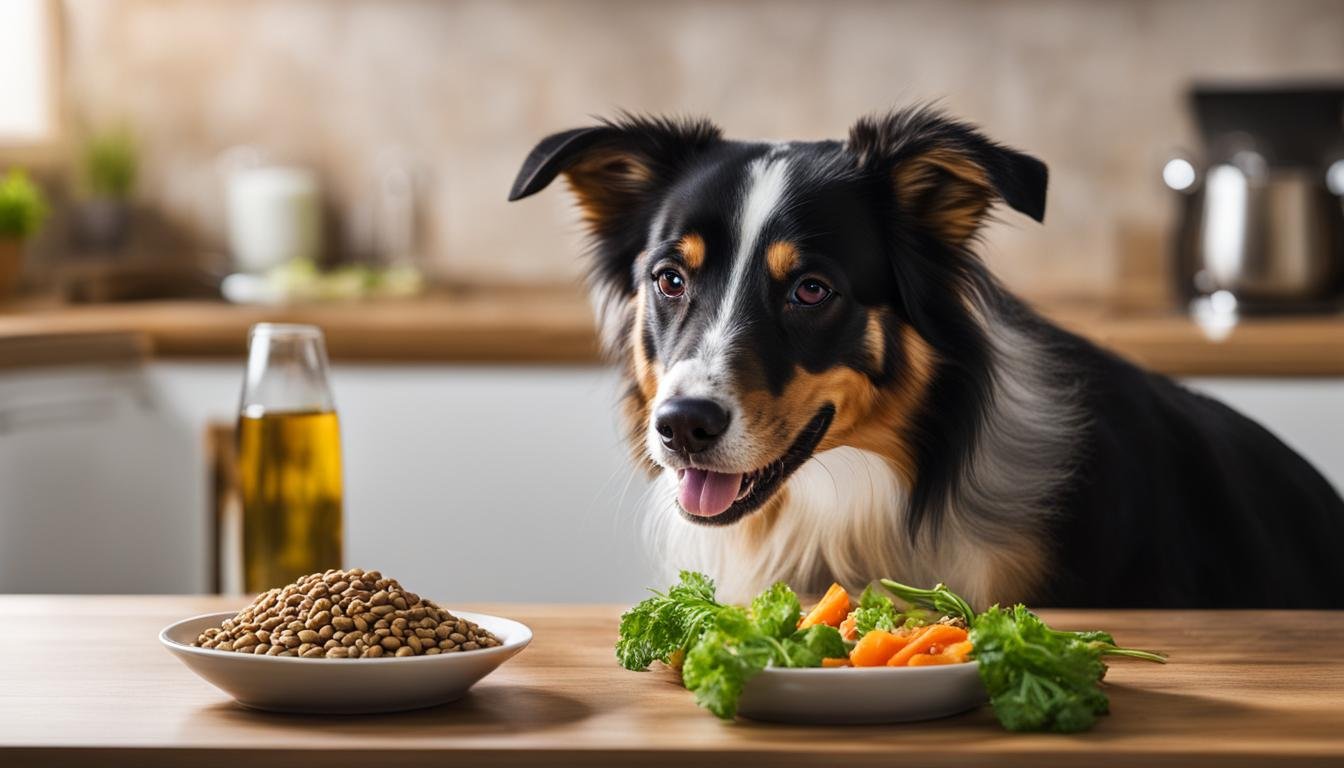What Do Dogs Eat? Your Guide to Healthy Canine Diets
Welcome to my comprehensive guide on what do dogs eat and how to create a healthy and balanced diet for your furry friend.
As a professional copywriting journalist, I have researched extensively on this topic to provide you with all the information you need to understand dog nutrition and feeding.
Whether you prefer commercial dog food, natural diets, or homemade options, this guide will help you make informed decisions about what to feed your dog.
Dogs are omnivores, which means they require a mix of protein, carbohydrates, fats, vitamins, and minerals to support their overall health. A balanced diet is essential to ensure that your dog gets all the nutrients they need to maintain optimal health and well-being.
Key Takeaways:
- Understanding your dog’s nutritional needs is the first step towards creating a healthy and balanced diet.
- Commercial dog food, natural diets, and homemade options are all viable choices for feeding your dog.
- A balanced diet for dogs includes protein, carbohydrates, fats, vitamins, and minerals.
- Feeding frequency and portion control are crucial for maintaining a healthy weight and avoiding health problems.
- Special dietary considerations may be necessary for dogs with health conditions or specific needs.
Dog Quiz
How well do you know dogs? Test your knowledge below!

Understanding a Dog’s Nutritional Needs
As a dog owner, it’s essential to understand the nutritional needs of your furry friend. Providing a balanced and nutritious diet is crucial for their overall health and well-being. Here are some dog-feeding tips and information on dog nutrition that you should know:
Dogs Require a Balanced Diet
A balanced diet for a dog should include proteins, carbohydrates, fats, vitamins, and minerals. Each nutrient plays a vital role in supporting the dog’s immune system, promoting healthy growth and development, and providing energy for daily activities. A balanced dog diet will ensure your pet receives the necessary nutrients in the right amounts.
Protein: A Crucial Component
Protein is essential for a dog’s growth, repair, and maintenance of tissues, muscles, and organs. Sources of protein include meat, poultry, fish, and plant-based options. It’s crucial to provide high-quality protein sources to support the dog’s needs, especially during growth phases. Moreover, the protein should account for at least 18% of a dog’s daily diet.
Carbohydrates and Fats: Energy Sources
Carbohydrates and fats provide energy to support a dog’s daily activities. Carbohydrates come from various sources, such as grains, vegetables, and fruits. A balanced diet will ensure that dogs receive a sufficient amount of carbohydrates that are easily digestible.
Fats are essential for maintaining healthy skin and coat, as well as supporting organs, such as the brain. Healthy sources of fat include fish oil, chicken fat, and vegetable oil. It’s essential to provide a balanced amount of carbohydrates and fats for your dog’s diet.
Vitamins and Minerals: Supporting Overall Health
Vitamins and minerals are essential for supporting the dog’s overall health and preventing diseases. Some essential vitamins for dogs include Vitamin A, B complex, D, E, and K, while important minerals include Calcium, Phosphorus, Iron, and Zinc.
While most commercial dog food includes essential vitamins and minerals, a homemade diet should be supplemented with additional vitamins and minerals to ensure a balanced diet.
Tip: Consult with your veterinarian before implementing a homemade dog food diet to ensure that your dog’s nutritional needs are being met.
Commercial Dog Food: Finding the Right Option

Commercial dog food is a popular choice for pet owners due to its convenience and availability. However, not all dog food is created equal, and it’s essential to choose the right option for your furry friend.
Dry Kibble
Dry kibble is the most common type of commercial dog food. It’s convenient, easy to store, and can be left out for your dog to graze on throughout the day. However, not all dry kibble is created equal, and it’s essential to read the label to ensure it contains high-quality ingredients.
| Ingredients to Look For | Ingredients to Avoid |
|---|---|
| Real meat (e.g., chicken, beef, lamb) | Meat by-products |
| Fruits and vegetables | Corn, wheat, and soy |
| Whole grains (e.g., brown rice, oatmeal) | Artificial preservatives, colors, and flavors |
Look for dry kibble that contains real meat as the first ingredient, and avoid brands that use meat by-products, which are low-quality and often include parts of the animal that are not suitable for human consumption.
Wet Food
Wet food is a popular alternative to dry kibble. It contains a higher percentage of moisture, making it an excellent option for dogs who need to stay hydrated or have dental problems that make it difficult to chew dry food. Wet food is available in cans or pouches and comes in a range of flavors and textures.
When choosing wet food, look for options that contain high-quality protein sources, such as real meat or fish, and avoid those that contain meat by-products or artificial preservatives.
Semi-Moist Food
Semi-moist food is another option for dogs who prefer a softer texture. It’s easy to chew and can be a great option for older dogs or those with dental issues. However, it’s important to note that semi-moist food often contains a high amount of sugar, which can be harmful to your dog’s health.
When choosing semi-moist food, look for options that contain high-quality protein sources and avoid those that contain added sugars or artificial flavors.
Regardless of the type of dog food you choose, be sure to read the label carefully and look for high-quality ingredients. Avoid options that contain fillers, such as corn and soy, and artificial preservatives, colors, and flavors. Remember, your dog’s health and well-being depend on a balanced and nutritious diet.
Natural Diets: A Closer Look at Raw and Fresh Food
If you’re looking for an alternative to commercial dog food, natural diets such as raw or fresh food may be a great option for your furry friend. These diets consist of uncooked or minimally processed ingredients that mimic a dog’s ancestral diet. While there are benefits to natural diets, it’s essential to understand the potential risks and considerations before making the switch.
One popular model for a natural diet is the Biologically Appropriate Raw Food (BARF) diet. This diet includes raw meat, bones, organs, fruits, and vegetables, and aims to provide a balanced blend of nutrients. However, it’s vital to note that the BARF diet does not have any scientific backing or regulation, so it’s important to consult with a veterinarian or canine nutritionist before implementing it.
Another option is a fresh food diet, which includes cooked meats, whole grains, and fruits and vegetables. With this diet, it’s crucial to ensure that your dog receives all the essential nutrients it needs, including protein, fats, vitamins, and minerals. Supplements may be necessary to meet these requirements.
When considering a natural diet, it’s important to keep in mind that it may not be suitable for every dog. Some dogs may have difficulty digesting raw or fresh food or may have specific dietary needs that cannot be met with a natural diet. Consult with your veterinarian or canine nutritionist to determine if a natural diet is right for your dog.
Pros of Natural Diets:
- May provide a more diverse range of nutrients
- May be easier to digest for some dogs
- May have fewer additives and preservatives
- May appeal to dogs with picky appetites
Cons of Natural Diets:
- May be more difficult and time-consuming to prepare
- May require additional supplements
- May not be suitable for all dogs
- May increase the risk of foodborne illness
“While natural diets may have benefits, it’s essential to understand the potential risks and considerations before making the switch.”
Overall, if you’re interested in feeding your dog a natural diet, it’s important to do your research, consult with a professional, and monitor your dog’s health closely. With the right approach, a natural diet can provide your dog with a healthy and balanced diet.
Homemade Dog Food: Cooking for Your Canine Companion

Homemade dog food can be an excellent option for pet owners who want to have more control over their dog’s diet. Not only can you ensure that your furry friend is getting all the necessary nutrients, but you can also avoid harmful additives and preservatives found in some commercial dog food.
However, it’s important to remember that creating a balanced and healthy homemade diet for your dog requires careful planning and consideration. Here are some tips to keep in mind:
1. Consult with Your Vet
Before making any changes to your dog’s diet, it’s crucial to consult with your veterinarian. They can help you determine if homemade dog food is appropriate for your dog’s specific needs and offer guidance on creating a balanced diet plan.
2. Choose High-Quality Ingredients
When preparing homemade dog food, it’s important to select high-quality ingredients. This includes lean meats, such as chicken, turkey, and beef, as well as a variety of vegetables and fruits. Avoid foods that are toxic to dogs, such as chocolate, grapes, and onions.
3. Follow a Balanced Recipe
Creating a balanced recipe is crucial to ensure that your dog is getting all the necessary nutrients. A balanced homemade dog food recipe should include about 50% protein, 25% vegetables, and 25% grains or other carbohydrates.
4. Avoid Unhealthy Additives
Avoid adding unhealthy additives to your homemade dog food, such as salt, sugar, and artificial flavorings. These can be harmful to your dog’s health and may lead to obesity and other health problems.
5. Monitor Your Dog’s Weight and Health
Once you start preparing homemade dog food, it’s important to monitor your dog’s weight and overall health. Make adjustments to their diet as necessary to maintain a healthy weight and avoid any nutrient deficiencies.
By following these tips, you can ensure that your homemade dog food provides all the necessary nutrients for your furry friend and promotes their overall health and well-being.
“Creating a balanced recipe is crucial to ensure that your dog is getting all the necessary nutrients.”
Essential Nutrients for Dogs
Dogs require specific nutrients in their diet to support their overall health. These nutrients include proteins, carbohydrates, fats, vitamins, and minerals. Each of these nutrients has a unique role in a dog’s body, and a balanced diet should contain adequate amounts of all essential nutrients.
Proteins: Proteins are crucial for building and repairing tissues in a dog’s body. They also play a crucial role in maintaining a healthy immune system. Adequate protein intake is necessary for dogs of all ages. High-quality protein sources include chicken, turkey, beef, lamb, fish, and eggs.
Carbohydrates: Carbohydrates provide energy and fiber to a dog’s diet and can come from sources such as grains, vegetables, and fruits. Dogs require a smaller amount of carbohydrates than proteins, but they are still an essential part of their diet.
Fats: Fats provide a concentrated source of energy and play a crucial role in maintaining healthy skin and coat. Omega-3 and Omega-6 fatty acids are especially beneficial for dogs and can be found in sources such as fish oil or flaxseed oil.
Vitamins: Vitamins are essential for various bodily functions and are divided into two groups: fat-soluble and water-soluble. Fat-soluble vitamins, such as vitamins A, D, E, and K, require fat for absorption and are stored in the body’s fatty tissues. Water-soluble vitamins, such as vitamin C and all B vitamins, need to be replenished regularly as they are not stored in the body.
Minerals: Minerals are essential for various bodily functions, including building strong bones and teeth, regulating fluid balance, and supporting healthy muscle and nerve function. Important minerals for dogs include calcium, phosphorus, iron, zinc, magnesium, and potassium.
“A balanced diet should contain adequate amounts of proteins, carbohydrates, fats, vitamins, and minerals.”
Protein Sources for Dogs

Protein is a crucial component of a dog’s diet as it is responsible for building and repairing tissues and muscles in their body. When it comes to protein sources for dogs, there are several options available:
| Protein Source | Nutritional Benefits |
|---|---|
| Meat (beef, chicken, turkey, lamb) | High-quality protein that is easily digestible and contains essential amino acids |
| Poultry (chicken, turkey) | Lean protein that is low in fat and high in essential amino acids |
| Fish (salmon, tuna, whitefish) | Great source of omega-3 fatty acids, which promote healthy skin and coat |
| Eggs | Complete protein that is easily digestible and rich in amino acids |
| Plant-based sources (tofu, lentils, peas) | Alternative protein source for dogs with allergies or sensitivities |
When selecting commercial dog food or preparing homemade meals, it’s important to choose protein sources that are high-quality and easily digestible. Avoid dog food with meat by-products or fillers and opt for whole meats instead.
Fun Fact: Did you know that dogs can get up to 50% of their protein from plant-based sources? However, it’s important to note that dogs have a shorter digestive tract than humans, so plant-based proteins must be supplemented with other essential nutrients to ensure a balanced diet.
Carbohydrates and Fats: Energy Sources for Dogs

Carbohydrates and fats play an important role in providing energy to dogs. Carbohydrates are the primary source of energy for dogs, and they are essential for maintaining healthy digestion and regulating blood sugar levels.
Some healthy carbohydrate sources for dogs include sweet potatoes, brown rice, and barley. However, it’s important to note that dogs do not require high levels of carbohydrates in their diet, and excessive intake can lead to weight gain and other health issues.
Fats are also necessary for a balanced dog diet, but it’s important to choose the right type of fats. Unsaturated fats, such as those found in fish and plant-based oils, are beneficial for dogs and can help maintain healthy skin and coat, support immune function, and reduce inflammation. Saturated and trans fats, on the other hand, should be avoided as they can lead to obesity and other health problems.
Healthy Fat and Oil Sources for Dogs
| Fat/Oil Type | Source |
|---|---|
| Omega-3 Fatty Acids | Fish oil, flaxseed oil, chia seeds |
| Omega-6 Fatty Acids | Evening primrose oil, borage oil, black currant oil |
| Monounsaturated Fats | Olive oil, canola oil, avocados |
It’s important to note that fats are more calorie-dense than other nutrients, which means that portion control is crucial. Dogs that consume too much fat can gain weight and become obese. Generally, fats should make up around 10-15% of a dog’s diet, depending on their individual needs and activity level.
By selecting the right types and amounts of carbohydrates and fats, you can ensure that your dog’s diet is balanced and healthy. Consult with your veterinarian to determine the best diet plan for your furry friend.
Vitamins and Minerals: Supporting Overall Health
Just like humans, dogs require a variety of vitamins and minerals to support their overall health and well-being. These essential nutrients are required in small amounts but play an important role in various bodily functions, such as growth, development, and immune system support.
Some important vitamins and minerals for dogs include:
| Vitamins | Minerals |
|---|---|
| Vitamin A | Calcium |
| Vitamin B1 (Thiamine) | Phosphorus |
| Vitamin B2 (Riboflavin) | Magnesium |
| Vitamin B3 (Niacin) | Iron |
| Vitamin B5 (Pantothenic acid) | Zinc |
| Vitamin B6 (Pyridoxine) | Copper |
| Vitamin B7 (Biotin) | Manganese |
| Vitamin B9 (Folic acid) | Selenium |
| Vitamin B12 (Cobalamin) | Iodine |
| Vitamin C | Chloride |
| Vitamin D | Potassium |
| Vitamin E | Sodium |
| Vitamin K |
Food sources of these vitamins and minerals include:
- Vitamin A: liver, sweet potato, carrots, spinach
- Thiamine: pork, fish, whole grains
- Riboflavin: liver, yogurt, cheese, eggs
- Niacin: chicken, turkey, fish, peanuts
- Pantothenic acid: chicken, beef, potatoes, oats
- Pyridoxine: chicken, fish, bananas, sweet potato
- Biotin: liver, egg yolks, peanuts
- Folic acid: liver, leafy greens, beans
- Cobalamin: beef, fish, cheese, eggs
- Vitamin C: oranges, strawberries, broccoli, spinach
- Vitamin D: oily fish, egg yolks
- Vitamin E: nuts, seeds, vegetable oils
- Vitamin K: liver, leafy greens, broccoli
- Calcium: dairy products, bone meal, green leafy vegetables
- Phosphorus: meat, fish, eggs, dairy products
- Magnesium: meat, fish, leafy greens, nuts
- Iron: red meat, liver, fish, egg yolks
- Zinc: meat, fish, dairy products, legumes
- Copper: liver, shellfish, nuts, seeds
- Manganese: meat, fish, leafy greens, whole grains
- Selenium: meat, fish, eggs, dairy products
- Iodine: seafood, seaweed, iodized salt
- Chloride: salt
- Potassium: meat, fish, fruits, vegetables
- Sodium: salt, processed foods
It’s important to note that too much of certain vitamins and minerals can be harmful to dogs, so it’s essential to provide balanced and nutritionally complete meals that meet their specific needs. Talk to your veterinarian about any dietary concerns or questions you may have.
Feeding Frequency and Portion Control

When it comes to feeding your dog, it’s important to find the right balance between underfeeding and overfeeding. Determining how much to feed your dog depends on several factors, including their size, age, activity level, and overall health.
A balanced dog diet should consist of a variety of nutrients, including proteins, carbohydrates, fats, vitamins, and minerals. Feeding your dog a well-rounded diet will not only help maintain their overall health but can also prevent common health issues such as obesity, diabetes, and heart disease.
Feeding Frequency
The number of times your dog should eat each day depends on their age. Puppies require more frequent feedings than adult dogs, and senior dogs may need to eat smaller meals more frequently. Here’s a general guideline for feeding frequency:
- Puppies: 3-4 small meals per day
- Adult dogs: 2 meals per day
- Senior dogs: 2-3 small meals per day
It’s essential to establish a regular feeding schedule for your dog that you can stick to. Dogs thrive on routine, and feeding them at the same time every day can help prevent digestive issues and promote good eating habits.
Portion Control
One of the most common mistakes pet owners make is overfeeding their dogs. Overfeeding can lead to obesity, which can cause a range of health issues. To prevent overfeeding, it’s important to measure your dog’s food and monitor their weight regularly.
The amount of food your dog needs depends on their size, activity level, and overall health. Start with the recommended serving size listed on the dog food packaging and adjust as necessary based on your dog’s individual needs.
Here’s a general guideline for the recommended daily food intake based on a dog’s weight:
| Dog Weight | Recommended Daily Food Intake |
|---|---|
| 10 lbs | 1/2 – 1 cup |
| 20 lbs | 1 – 1 1/2 cups |
| 50 lbs | 2 – 2 1/2 cups |
| 100 lbs | 4 – 4 1/2 cups |
It’s important to remember that these are only guidelines, and each dog is different. Consult with your veterinarian to determine the appropriate serving size for your dog based on their individual needs.
By following these feeding frequency and portion control guidelines, you can help ensure your dog maintains a healthy and balanced diet. Remember to always provide fresh, clean water and seek advice from your veterinarian regarding any dietary concerns or changes.
Special Dietary Considerations for Dogs
While most dogs thrive on a balanced diet consisting of proteins, carbohydrates, fats, vitamins, and minerals, some may have unique dietary needs or health conditions that require specific attention.
As a responsible pet owner, it’s crucial to understand these considerations and provide suitable nutrition for your furry friend. Here are some common special dietary considerations for dogs:
1. Food Allergies and Sensitivities
Just like humans, dogs can have food allergies or sensitivities. Some common allergens for dogs include beef, chicken, dairy, eggs, wheat, and soy. If your dog exhibits symptoms such as itching, skin irritations, digestive issues, or respiratory problems after eating these foods, they may have an allergy or sensitivity. Consult with your veterinarian to identify the allergenic food and find appropriate substitutes to avoid adverse reactions.
2. Weight Management
A healthy weight is crucial for a dog’s overall well-being. Obesity can lead to various health issues, including joint problems, diabetes, and heart disease. If your dog is overweight, you may need to modify their diet to reduce calorie intake and increase exercise.
Conversely, if your dog is underweight, they may need additional protein and calorie-rich foods to gain weight. Consult with your veterinarian to determine the appropriate diet plan for your dog’s weight management.
3. Health Conditions
Some health conditions, such as kidney disease, liver disease, diabetes, or cancer, require specific dietary considerations. Dogs with kidney or liver disease may need a restricted protein diet to reduce the workload on these organs.
Dogs with diabetes may require a diet low in simple sugars and high in complex carbohydrates. Dogs with cancer may benefit from a diet rich in antioxidants and anti-inflammatory foods. Consult with your veterinarian to determine suitable dietary options for your dog’s health condition.
4. Senior Dogs
As dogs age, their nutritional requirements change. Older dogs may have reduced calorie needs, decreased appetite, and dental issues that affect their ability to chew food.
A senior dog’s diet should include high-quality protein, easily digestible carbohydrates, and essential nutrients to support their aging body. Consult with your veterinarian to determine the appropriate diet plan for your senior dog.
Creating a Healthy and Balanced Diet for Your Dog
After learning about dog nutrition, it’s important to put that knowledge into action to ensure your furry friend is getting a healthy and balanced diet. Here are some practical steps you can take:
Consider Your Dog’s Age, Size, and Activity Level
Every dog is unique and has different nutritional needs based on their age, size, and activity level. Puppies and senior dogs require different nutrient ratios than adult dogs, and active dogs may need more protein and calories than sedentary ones. Consult with your veterinarian to determine your dog’s specific dietary needs.
Choose High-Quality Dog Food
Whether you opt for commercial dog food or homemade meals, always choose high-quality ingredients that meet your dog’s nutritional needs. Look for dog food labeled as complete and balanced by the Association of American Feed Control Officials (AAFCO) and avoid ingredients like fillers, by-products, and artificial preservatives.
Introduce New Foods Gradually
If you are introducing new foods or changing your dog’s diet, do it gradually to avoid digestive issues. Start by mixing a small amount of the new food with your dog’s current food and gradually increase the amount over several days. Observe your dog for any signs of discomfort or allergies.
Control Portion Sizes
Overfeeding can lead to obesity and other health problems, while underfeeding can result in malnutrition and weight loss. Use a measuring cup to portion out your dog’s food based on their daily calorie requirements. Refer to the feeding guidelines on the dog food label or consult with your veterinarian.
Monitor Your Dog’s Body Condition
Regularly check your dog’s body condition score to ensure they are maintaining a healthy weight. You should be able to feel their ribs without excess fat covering them, and their waist should be visible. If your dog is overweight or underweight, adjust their portion sizes accordingly.
Supplement with Vitamins and Minerals, if Necessary
If your dog has a restricted diet or health condition that requires additional nutrient supplementation, consult with your veterinarian about adding vitamins and minerals to their diet. Do not supplement without veterinary advice, as over-supplementation can be harmful to dogs.
By following these guidelines and paying close attention to your dog’s nutritional needs, you can create a healthy and balanced diet that will help them maintain optimal health and wellness.
More About Dogs:
- How Do Dogs Mate? – Dogs Reproduction Explained
- How Long Do Dogs Live? Dog Life Expectancy
- 15 Facts About Dogs You Didn’t Know
- Dog Quiz: How Well Do You Know Dogs?
Frequently Asked Questions
What do dogs eat?
Dogs eat a variety of foods, including commercial dog food, natural diets, and homemade meals. It is important to provide them with a balanced and nutritious diet.
How do I understand a dog’s nutritional needs?
Dogs require proteins, carbohydrates, fats, vitamins, and minerals in their diet. Understanding their nutritional needs helps ensure their optimal health and well-being.
What should I consider when choosing commercial dog food?
When selecting commercial dog food, it is important to read labels and look for high-quality ingredients. Different types of dog food, such as dry kibble, wet food, and semi-moist options, are available in the market.
What are the benefits of natural diets for dogs?
Natural diets, such as raw or fresh food, offer various benefits for dogs. They can be a healthier and more natural alternative to commercial dog food, providing a range of nutrients.
Can I feed my dog homemade dog food?
Yes, homemade dog food can be a great option for pet owners who want more control over their dog’s diet. It is important to follow guidelines and ensure a balanced recipe.
What are the essential nutrients for dogs?
Dogs require proteins, carbohydrates, fats, vitamins, and minerals in their diet to support their overall health and well-being.
What are good sources of protein for dogs?
Dogs can obtain protein from various sources, including meat, poultry, fish, and plant-based options. It is important to choose high-quality protein sources.
What role do carbohydrates and fats play in a dog’s diet?
Carbohydrates and fats are energy sources for dogs. Carbohydrates provide quick energy, while fats provide sustained energy. It is important to choose healthy sources of both.
What vitamins and minerals do dogs need?
Dogs require a range of vitamins and minerals for various bodily functions. Natural food sources can provide these essential nutrients.
How often should I feed my dog, and how much?
Feeding frequency and portion control depend on your dog’s age, size, and activity level. It is important to follow guidelines and avoid overfeeding or underfeeding.
Are there special dietary considerations for dogs with allergies or sensitivities?
Yes, some dogs may have allergies or sensitivities that require special dietary considerations. It is important to address these issues while still maintaining a balanced diet.
How can I create a healthy and balanced diet for my dog?
Creating a healthy and balanced diet involves understanding your dog’s nutritional needs, selecting appropriate food options, and monitoring their body condition and overall well-being.







